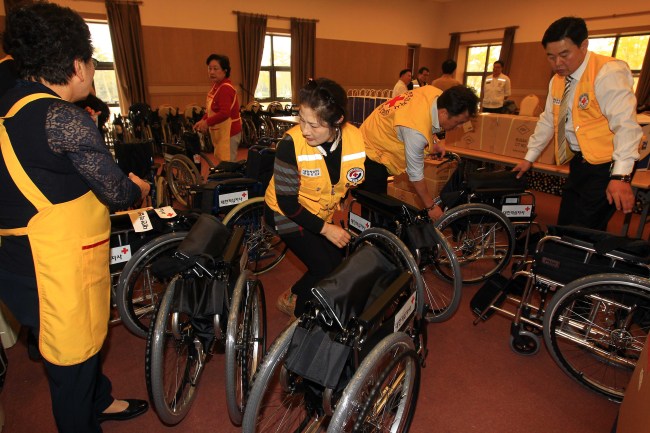Nearly 400 South Koreans will gather in Sokcho, Gangwon Province, Monday, a day before they travel across the border into the North to reunite with family members they have been separated from since the end of the 1950-53 Korean War.
 |
| South Korea`s Red Cross workers check wheelchairs at a hotel in Sokcho, Gangwon Province, on Sunday. (Yonhap) |
At Hanwha Resorts, a total of 394 people will be briefed on an array of issues including details about the reunions at Mount Geumgangsan, their health care and what they should be cautious about in the communist state.
They have been given the opportunity to attend the first round of the reunions, as 96 families in the North, which Pyongyang has selected, have sought to meet them.
The first round will continue through Thursday, followed by the second and last round that will end next Monday. During the second round, 255 people from 90 families, which the South’s Red Cross selected through a computer lottery, will meet their relatives in the North.
The reunions, which will be the first since February 2014, were arranged after the two Koreas reached a comprehensive agreement on Aug. 25 to ease cross-border tensions, seek regular high-level talks and bolster civil-sector exchanges.
On Tuesday, a total of 541 South Koreans including 118 staffers to facilitate the reunions and 29 press people will travel to Mount Geumgangsan.
During the three-day program, the participants will meet their relatives six times — each for two hours. They will meet for two group reunions, a welcome reception, one individual gathering, one joint dinner session and farewell reunions.
Seoul authorities have paid much attention to the health care of the participants as there are more old family members — a reason they increased the number of medical staffers to 18 from 12 in the previous 2014 reunions. Dozens of the participants are in their 90s.
Seoul has regarded the issue of the separated families as an urgent humanitarian one, as many family members pass away due to old age each year.
It is presumed that more than 60,000 people, including more than 1,000 South Korean nationals living abroad, remain alive.
The South Korean side has sought to exchange lists of the surviving members of families with the North, allowing the families to exchange letters and meet through video links, in addition to holding the reunions on a regular basis.
But it remains unclear whether the North will agree to Seoul’s proposal, as it could potentially enable the flow of outside information into the highly controlled society and pose a threat to the dictatorial regime, observers said.
By Song Sang-ho (sshluck@heraldcorp.com)

